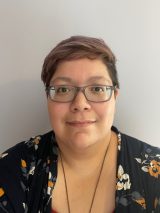 Theresa A. Benedict
Theresa A. Benedict
She:kon sewakwe:kon. Teres ion:kia’ts tanon Kaheratonkwas Onkwehonwehneha. Wake’nehsi:io tanon Akwesasne ki:teron.
Hello, my name is Theresa Benedict and my Mohawk name is Kaheratonkwas “she is picking the cornstalks” and pronouns are she/her. I am a member of the Mohawks of Akwesasne, a member of the Snipe clan, and live and work in the Akwesasne Mohawk territory. I graduated from Trent University in 2018 with a B.A in Indigenous Studies and started working for the Mohawk Council of Akwesasne in the Aboriginal Rights and Research Office. My work as a researcher focuses on historical research for land claims and community projects, collaborating with other First Nations on projects, and consulting with federal government groups on conservation of land and historical sites.
I am taking the MA specialization in Canadian Studies and Digital Humanities and was drawn to both programs because of my interests in Canadian and Indigenous history and using digital media and technology as tool for preservation, education, and research. My goals for learning from these programs are to take digital media, such as video games and make Indigenous culture and history fun and educational, while preserving our culture the way we want to for our future generations.
On my free time I enjoy reading fantasy novels, making beadwork for family and friends, and playing video games with my partner.
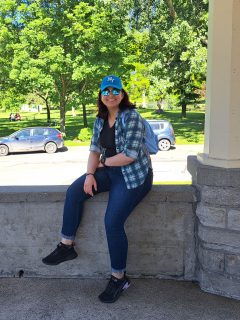 Akbel Guzide
Akbel Guzide
I am a first year M.A. student in the Canadian Studies program under the Concentration in Heritage Planning and Studies. I am a settler Canadian with family from Türkiye and I moved to Ottawa, the unceded Algonquin Anishinaabe territory, when I was young. My pronouns are she/her. I recently graduated from Carleton University with a Bachelor of Architectural Studies in the Urbanism program and with a minor in Heritage and Conservation in June 2023.
My research interests include the preservation of historic sites, from local to world heritage, as well as from individual historic buildings and monuments to larger environmental sites. In particular, I am interested in Indigenous historic sites and learning about their methods in preserving these sacred sites and their cultures. I am also interested in the different opportunities of collaborative work that can be reached between Indigenous groups and the government with these historic sites.
In my free time, I enjoy reading, doing puzzles, visiting museums, and being outdoors.
Christine Mao
Christine Mao is a Canadian-born Chinese from Toronto, Ontario, currently living as a guest on unceded and unsurrendered Algonquin territory. She has been a member of ACTRA since 2013. You may recognize Christine from her appearances in TV and film productions on CBC (The Best Laid Plans, Michael: Every Day, and Season 3 of Kim’s Convenience), NBC (Taken, Season 2), the W Network (A Husband’s Confession), and YTV (Zoink’d); or you may remember her singing and comedic performances in Unhappily Ever After on stage at Centrepointe Studio Theatre and Absolute Comedy in Ottawa, Ontario. Either way, Christine is known for being a real character – someone who makes a lasting impression on those she meets.
Christine’s academic background includes being Called to the Degree of Barrister-at-Law with The Law Society of Upper Canada in 2000, graduating with a Bachelor of Laws from the University of Windsor in 1998, and an Honours Bachelor of Arts, majoring in psychology, and minoring in sociology from Wilfrid Laurier University in 1995. She is currently working towards her Master of Arts in Canadian Studies, on a part-time basis, with the School of Canadian Studies at Carleton University.
Since 2010, Christine has built and earned a reputation for being passionate about diversity, equity and inclusion. She has earned multiple awards for her work. As well, in 2015, she participated in the ACTRA National Diversity Committee’s Short Film Competition 2.0, and she was 1 of the 3 winners selected from across Canada. The challenge was for ACTRA members to submit a script answering the question, “How are diverse Canadian stories important for our screens and our society?” Her answer, entitled Drum With Us, is available on YouTube.
In addition to her day job (as a federal public service leader – Senior Advisor to Chief Equity and Inclusion Officer at Innovation, Science and Economic Development Canada), Christine is also a spouse, a mom, a mentor, and she is also 1 of 3 Co-Guiders with the 42nd Barrhaven Pathfinders/Rangers Unit.
Christine is keen to learn more about accessibility, diversity, equity and inclusion so that together, we can build and support a more diverse, equitable and inclusive community for us all.
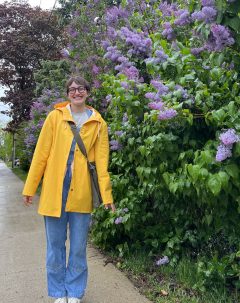 Maya Mills
Maya Mills
My name is Maya Mills, and I was born in Prince Edward Island or Epekwitk, the traditional territory of the Mi’kmaq people. However, I have lived on the unceded unsurrendered land of the Algonquin Anishinaabe people for most of my life.
I grew up spending most summers in New Brunswick, visiting the ocean regularly; this is where I developed a keen interest in the heritage of coastal towns and their relationship with the ocean. As a student in the M.A. Canadian Studies with a Concentration in Heritage Planning and Studies program, I hope to explore this relationship — the heritage of organically evolved landscapes. My other areas of interest include community engagement in heritage planning and digital storytelling as a tool for public education of built heritage.
My background is in public relations and communications. I have worked as a writer, editor, and communications strategist. My passion for storytelling sparked my interest in Canadian studies — using my skills as a communicator and digital storyteller, I hope to bring the untold or silenced stories in Canadian history to the forefront.
In my free time, I enjoy reading, writing, cycling, and photography.
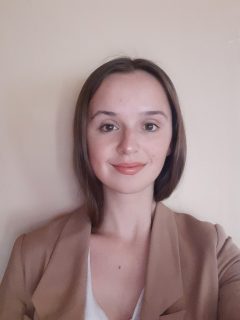 Anhelina Ostapyk
Anhelina Ostapyk
Anhelina is a first-year master’s student at the School of Canadian Studies. In 2022, she earned the degree of Honours Bachelor of Social Sciences in Anthropology and Minor in Psychology from the University of Ottawa. She is a proud Ukrainian Canadian, born and raised just outside of Ottawa—on the unceded and unsurrendered territory of the Anishinabe Algonquin Nation.
Anhelina’s academic research interests include cultural revitalization in First Nations, Inuit, and Métis communities; the decolonization of Turtle Island; and memory studies with a focus on lived experience and intergenerational transmission of trauma. She believes in popularizing and building access to critical knowledge in Canada. She hopes to use new and stronger methods of knowledge distribution—those that can make critical knowledge accessible for all—to share her research findings.
Anhelina is a firm believer that the best way to learn is to never stop asking questions.
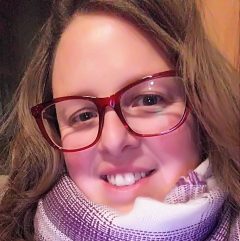 Michelle Taylor
Michelle Taylor
I am a student in the Canadian Studies program with an Honours BA in Law and a minor in Indigenous Studies, as well as a diploma in Forestry. Additionally, I have a practical education in politics after four campaigns as a candidate at the provincial and federal levels. My ancestry is a combination of refugee and colonial settler, and I currently reside on dishonoured treaty land.
As an avid researcher and writer, my main areas of interest are socio-economic rights, Crown- Indigenous Nations treaties and unceded land rights, judicial reform, environmental sustainability, and progressive public policy. I strongly believe in the power of education and the importance of taking deliberate, meaningful steps towards decolonization and an anticapitalistic state.
Outside the classroom, I enjoy spending time outdoors and travelling as much as possible with my partner and four children, always ready for a new adventure!
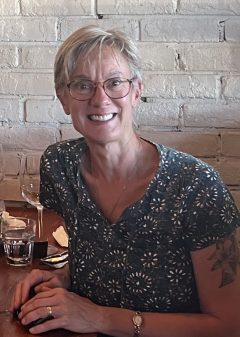 Gyn Wylie
Gyn Wylie
I originate from BC where sunshine was usually liquid, and memories were of sailing with family among the Gulf Islands and up the Sunshine Coast. However, my educational and professional background are business related as I obtained a Business and Liberal Arts Bachelor of General Studies degree from Simon Fraser University and an Honours Certificate of Management in Human Resources from British Columbia’s Institution of Technology. This allowed me to sit my exams for certification as a Certified Human Resources Professional.
I then worked for 25 years as a senior executive in the BC private healthcare industry. During that time, I created Canada’s first communication tool for siblings of children with cancer, built two fertility centres, a private laboratory, and facilitated accreditations through Accreditation Canada and the College of Physicians and Surgeons of British Columbia.
Today though, my interests have shifted, and I am more concerned with the villages of southeastern Ontario. I hope through my M.A. studies, to gain a thorough understanding of the dynamics that politics, Indigenous rights, immigration law, and racism had upon the development of these early settlements.
